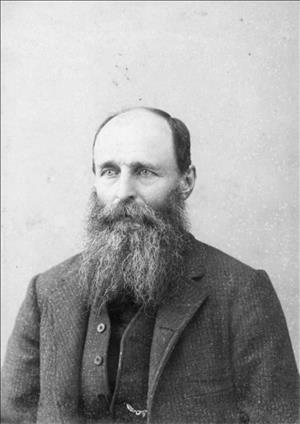Jeremiah Borst is considered to be the father of the Snoqualmie Valley, located in north central King County. A soft-spoken man with a lisp, he was the first permanent non-Indian settler in the valley. He planted an orchard, raised onions and potatoes, grazed cattle, and eventually went into hop farming.
Early Years
Born and raised in Tioga County, New York, Borst traveled west by ox team in 1850 to seek gold in California. He found it, and made enough money to rent a farm near Sacramento. By 1858, he had made $8,000 from raising barley, and was eager to move on. He was tempted to return home, but he decided instead to travel north to Seattle.
His sister, Diana (Borst) Collins, wife of Luther Collins, had settled on the Duwamish River in 1851, one of the party of first non-Indian settlers in King County. Presumably Borst stayed with her for a time, but soon heard of gold mines east of the Cascade Mountains. On the way to the mountain passes, he came upon the Snoqualmie River and its valley and was so taken with its natural beauty and fertile soil that he decided to settle down. He was 28 years old.
Hard Work and the Fruits of Labor
His first property was a 160-acre, pre-empted claim that was 2.5 miles north of Snoqualmie Falls. Fort Alden, a blockhouse that had been abandoned the previous year, served as his first cabin. To transport supplies needed to develop his site, he walked the Cedar River trail back and forth from Seattle, a distance of more than 20 miles. Often he carried his goods on his back.
Soon, other settlers arrived, including Joseph Fares (1837-1922) and his wife Lucinda (1838-1886), who was Borst’s niece. In 1865, Borst accompanied Seattle pioneer Arthur Denny’s exploring party to the Cascades and became one of the first non-Indians to travel over what would become Snoqualmie Pass. In 1868, Borst took charge of building the first road through the pass.
Borst’s first farm had a fruit orchard and he also grew potatoes and onions. As time went on, he pastured cattle on their way through the pass from Eastern Washington, and later bred hogs. He hired Indians to help with the farming and also to transport cured meat down the Snoqualmie River to Everett and farther on down the Sound into Seattle.
Family Man
Borst married three times, each time to an Indian woman. Little is known about his first wife Sally, but he and his second wife Mina had five children. Mina was the daughter of The Widow, an Indian woman so named by early settlers because her husband, a chief of the Snoqualmie tribe, had died and she did not remarry.
After Mina died in 1876, Borst married Kate Kanim Smith, a half-sister to Chief Jerry Kanim of the Snoqualmies. Kate Borst lived well into the twentieth century, and was well known and respected by many throughout the valley.
The Best of Times
By the time Borst married Kate, he was already quite wealthy and successful. He operated the trading post nearest to the pass, and owned almost all the land in the prairie. Eager to have more people move into the valley, he aided many of them financially. He paid the salaries of the first schoolteachers, and later served on the first school board. He also served two terms as King County commissioner.
Borst was so honest and trusting, he assumed that others would be the same. Often he would come out on the bad end of a deal, but he never once lost his faith in human nature.
By the 1880s, Borst had switched his crops to hops and was doing quite well. In 1882, the Hop Grower’s Association was established and Borst sold them nearly 1,000 acres, almost all of his land. He purchased property in Fall City, moved in and platted the town in preparation for the railroad. His dream of seeing the valley go from an untamed wilderness to a thriving community had come to pass.
"A Kindly, Gentle, Honest Man"
The burgeoning hop industry continued to bring wealth, employment, and settlers to the valley throughout the 1880s, until, in 1890, an aphid infestation killed the entire crop. Also in that year, Jerry Borst died.
He had traveled to Green River Hot Springs, in southern King County, seeking a remedy for his daughter Alice, who was afflicted with rheumatism. While there, he contracted typhoid fever. He died on August 10, 1890, at the age of 60. He is buried in the Fall City cemetery.
In his obituary, his friend and fellow pioneer William H. Taylor had this to say:
"Jerry Borst was a kindly, gentle, honest man, always helping those who needed help. I do not know what the early settlers would have done without him. They all looked to Jerry for everything."

